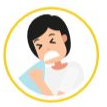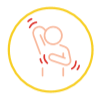Congestion
What’s The Cause And How To CopeCOLDS
If you’ve caught a cold, you can experience host of uncomfortable symptoms including congestion with some or all of the following:


COPING WITH A COLD
Normally, you don’t need to see your GP if you have a cold. It’s caused by a virus and antibiotics don’t work with viruses, so your best bet is to look after yourself at home.
Consider taking an over the counter remedy to help you manage the symptoms. Lemsip has a good range of cold and flu products, including decongestants.1
CHEST CONGESTION
Your chest gets congested when your body produces more mucus than usual. You can have a cough that brings up mucus. The inflammation and build-up of mucus can also cause wheezing and/or a sore throat. And you may find it difficult to sleep.
It’s normal to experience extra chest mucus from time to time. But if it’s happening regularly and is very uncomfortable, or if there are other symptoms, consider seeing your GP.
Chest congestion can be caused by:


COPING WITH
CHEST CONGESTION
Here are some ways you can cope with chest congestion:
 Drink warm fluids. Staying hydrated thins the mucus
Drink warm fluids. Staying hydrated thins the mucus
 Gargle with half a teaspoon of salt in warm water
Gargle with half a teaspoon of salt in warm water
 Steam loosens mucus and reduces coughing
Steam loosens mucus and reduces coughing
 Take lemon / garlic / ginger / honey in a hot drink
Take lemon / garlic / ginger / honey in a hot drink
 Use a humidifier / vaporizer / inhale over a bowl/hot shower/bath
Use a humidifier / vaporizer / inhale over a bowl/hot shower/bath
 Take a Lemsip decongestant powder/oral solution2
Take a Lemsip decongestant powder/oral solution2
Coughing is a natural and normal way the body gets rid of excess extra mucus or irritants from the lungs. It can even help remove germs to prevent infection.
But coughing at night can be a problem. It can be worse than during the day. If you are lying flat in bed, the mucus can pool in the back of the throat (known as postnasal drip) and create a cough. It can be really tiring and stop you sleeping when you need it most – to recover. If you’re struggling to sleep, try popping a few extra pillows under your head to raise it and open up your chest.3
Good news, you can ease your symptoms to help you cope and get on with life. There is a good range of Lemsip cough remedies, decongestant powders and oral solutions specially designed for chest congestion. Available over the counter at your local pharmacy or supermarket.
There's no quick-fire way of treating congestion in the chest brought on by a viral infection. It’s a natural immune response and usually clears up on its own when your system has fought off the virus. That can take anything from a few days, up to a couple of weeks.
There’s usually no need to see a GP, especially if you’re otherwise healthy and can eat and drink OK. In some cases, however, it’s wise to speak to your GP; if you’re over age 65, have an existing health problem or you’re experiencing lots of wheezing. Or if your cough and congestion doesn’t go away on its own after a few weeks, and you’re concerned about any of your symptoms.
SINUS INFECTION
Also known as sinusitis, where your sinuses swell up. It’s common after a cold or flu and is usually caused by an infection. It will usually clear up on its own, within 2 or 3 weeks. If it’s taking longer, you may want to consider taking medicines.
The symptoms of sinusitis can include:
Signs to look out for in young children could include irritability, difficulty feeding, and breathing through the mouth.


COPING WITH
sinusitis/sinus infection
You can often treat mild sinusitis without seeing a GP by:
 Avoiding allergic triggers and not smoking
Avoiding allergic triggers and not smoking
 Cleaning your nose with a salt-water solution to ease congestion
Cleaning your nose with a salt-water solution to ease congestion
If your symptoms persist however, or you continue to feel unwell, it’s a good idea to see your GP.4

RB-M-02447
SOURCES

























